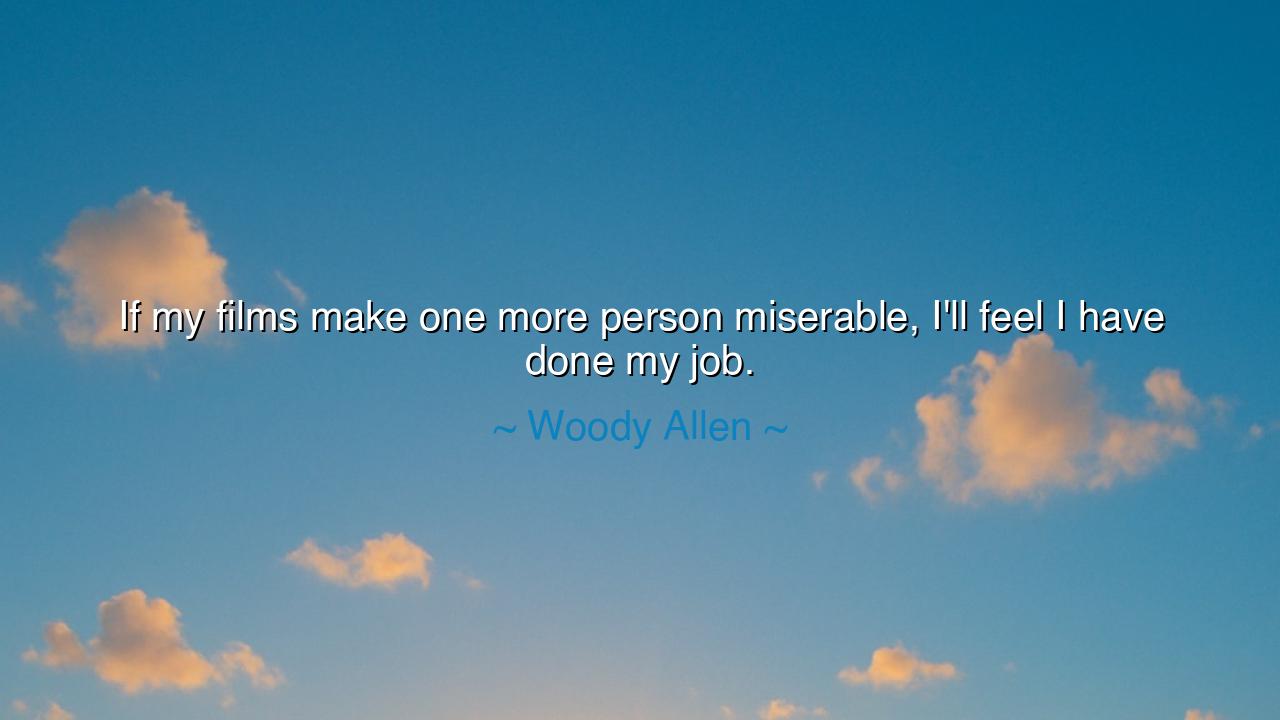
If my films make one more person miserable, I'll feel I have






"If my films make one more person miserable, I'll feel I have done my job." With these stark words, Woody Allen encapsulates the paradox at the heart of much of his work—a deep, sometimes unsettling exploration of the human condition. This quote suggests that misery—while not the end goal of life—plays a role in the creative process. Allen’s films, often filled with dark humor, anxiety, and existential dread, are designed not merely to entertain but to probe the deepest vulnerabilities of the human soul. Through his characters’ pain, confusion, and inner turmoil, Allen holds a mirror to society, daring us to confront uncomfortable truths about the fragility of existence. His work does not shy away from the darkness of life; instead, it invites us to sit with it, to acknowledge the miserable aspects of the world, and perhaps, in doing so, find a moment of clarity or understanding.
Allen’s remark can be seen as an embrace of the tragic-comic nature of existence, much like the ancient Greek philosophers who understood that life is defined not just by joy but by suffering and struggle. Socrates, for example, believed in the importance of questioning and examining life, which often led to uncomfortable or even painful realizations. For the Greeks, life was full of paradoxes—moments of great happiness intertwined with periods of grief, and this tension between opposites was essential to the human experience. Aristotle, too, saw the role of tragedy in human life, arguing that it could cathartically purify emotions like pity and fear, leading to greater wisdom. In this light, Allen’s films aim not to provide easy answers or escapism, but to explore the nuances of human emotion, giving voice to sorrow as much as to joy.
Allen’s self-awareness in his quote suggests a deliberate rejection of the simplistic and the comfortable. In a world where entertainment often seeks to uplift or distract, he positions himself as a creator who seeks to disturb as much as to entertain. This is a reflection of the tragic heroes of antiquity, figures like Oedipus or Antigone, whose journeys were marked by suffering and self-realization. Much like these heroes, Allen’s characters often confront their deepest flaws and fears, revealing the humility that comes with understanding our own imperfection. The misery Allen refers to in his quote is not the simple sadness that comes from the absence of joy, but the complex anguish that arises when we face the truths about life and our place within it.
This theme is evident in Allen’s films such as Annie Hall, Husbands and Wives, and Manhattan, where the characters grapple with love, identity, and the meaning of life—often in ways that expose their own self-deceptions. Take Husbands and Wives, where the central characters experience the disintegration of their marriages and personal identities. The discomfort felt by viewers as they witness the unraveling of their relationships is a form of artistic disruption—one that forces the audience to confront uncomfortable realities about their own relationships and the inherent impermanence of human connection. Allen’s ability to capture these raw, unsettling moments reflects his commitment to exploring not just the funny and lighthearted but the darker, more uncomfortable aspects of existence.
The lesson in Allen’s words is profound: sometimes, the most meaningful art is that which does not shy away from the darker aspects of life but instead faces them head-on. Just as Socrates taught that self-examination is essential to true wisdom, Allen invites us to examine our own emotions—to confront our fears, insecurities, and discomforts. Misery in Allen’s films is not the end but a means to understanding, an opportunity to grow. It is in these moments of discomfort that we are often forced to question our assumptions and begin the process of self-reflection. It is in this vulnerability that art reaches its highest potential—not as an escape, but as a mirror that reflects our complexity.
In practical terms, Allen’s quote encourages us to embrace the messiness of life—acknowledging that struggle, pain, and discomfort are part of the human experience. Rather than seeking to distract ourselves from these feelings, we must learn to engage with them in a way that allows for growth and insight. Whether in our work, relationships, or personal endeavors, we should embrace the moments that challenge us, that make us uncomfortable, for it is in those moments that we find our deepest lessons. Like Allen’s films, our lives can be rich and meaningful when we confront the full spectrum of human emotion, embracing both the joy and the misery that comes with being alive.
Ultimately, Woody Allen’s perspective offers us a path toward maturity—one that encourages us to examine and accept the darkness within ourselves and in the world around us. Through this process of engagement with our sorrow, we can discover not only compassion for others but also a deeper understanding of the human condition. By accepting the misery in life as part of the broader tapestry of experience, we come to appreciate the fullness of life itself—its beauty, its complexity, and its impermanence. Through this, we become more attuned to the richness of existence, and in turn, are better able to live with purpose and clarity.






AAdministratorAdministrator
Welcome, honored guests. Please leave a comment, we will respond soon